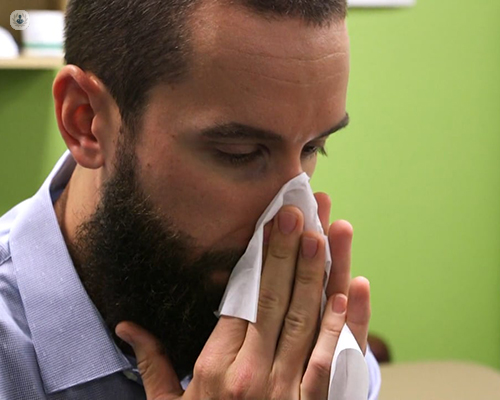Losing your sense of smell
Written by:Most of us take our sense of smell for granted and we usually only realise its importance once it's gone. In this article below, Leading ENT surgeon Professor Carl Philpott highlights some of the main causes of losing this sense.

What are the most common causes of loss of smell?
There are many possible causes of loss of smell, which range from minor problems like the common cold or hay fever, to obstructions caused by abnormalities like tumours, nasal polyps and a deviated septum. Research also indicates that it can also be linked to serious neurological conditions like Alzheimer’s, Parkinson’s disease, and multiple sclerosis. For many years such links have been largely ignored, but now scientists are championing their use as diagnosis-aiding tools.
Can loss of smell be a symptom of serious conditions?
Studies show that the pathology of neurological diseases, such as Parkinson’s, begin in the nose, happens long before signs are visible anywhere else. There are numerous examples of patients losing their sense of smell years before they are diagnosed with a serious neurological condition. The statistics also support this theory; 38 per cent of people with multiple sclerosis and between 45 and 96 per cent of people with Parkinson’s disease show signs of loss of smell five years prior to diagnosis. As a result, smell tests are now being used to detect such conditions earlier than ever before.
Neurological conditions are not the only cause of smell impairment, it is believed that one in five people have some sort of problem with their sense of smell, with 0.3 per cent reporting a complete loss. Recent research shows that smell loss may also be connected to mental health disorders like depression and schizophrenia. A 2016 study showed that men suffering from depression were more likely to have problems with their sense of smell, while those experiencing loneliness found it more difficult to identify different scents. In a separate study of over 2,000 people between the ages of 71 and 82 with an impaired sense of smell, it was discovered that they had an almost 50 per cent higher chance of dying within 10 years, than those with no smell problems.
Is diet linked to sense of smell?
Your health is undeniably linked to your diet. After analysing the dietary habits of patients with smell loss, it was found that a third of them were overeating, while a third of them were undereating. Our sense of smell can account for up to 70 per cent of the flavours we taste, which explains why it’s harder to taste food when you have a blocked nose and why losing it can result in loss of appetite.
How can losing your sense of smell affect your life expectancy?
Another possible reason for the link between sense of smell and life expectancy is that smell impairments can lead to greater exposure to dangerous situations. For example, if you’re walking down the street and you smell car fumes, you’d automatically cross the road or speed up. Someone with an impaired sense of smell would not notice the smell, which would lead to them inhaling more of the toxic fumes.
Can your sense of smell ever come back?
It is also believed that, as well as the parts of the brain involved in recognising smell, parts important for motor control, processing emotions and rational thinking, like the cingulate cortex, may shrink as a result of loss of smell. The good news is that these parts can grow back as a person regains their sense of smell and there are plenty of methods being invented to aid this.
So, if you’re experiencing problems with your smell, it’s important to have it looked at by a specialist. Help is available. Professor Carl Philpott is a leading ENT specialist in Norwich and Great Yarmouth. You can request an appointment with him by visiting his Top Doctors profile.


